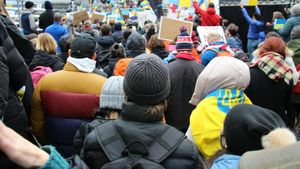The political dynamics between the United States and Venezuela have entered another tense phase with the U.S. government's recent recognition of Edmundo González as the president-elect of Venezuela. This announcement came on November 19, 2024, several months after the controversial elections held on July 28, where the incumbent president Nicolás Maduro was declared the winner amid allegations of electoral fraud and manipulation.
Initially, the Biden administration had noted González's significant electoral lead, affirming he secured more votes than Maduro; nevertheless, it stopped short of formally recognizing him. U.S. Secretary of State Antony Blinken's declaration marked the first time the Biden administration officially called González the president-elect, emphasizing respect for the democratic will of the Venezuelan people.
"The Venezuelan people spoke resoundingly on July 28 and made Edmundo González the president-elect," Blinken articulated via social media. His comments came during his participation at the G20 summit held in Brazil. Blinken’s announcement reflects what many perceive as a shift in U.S. policy, aiming to bolster support for the opposition against Maduro's government.
Venezuela's National Electoral Council, heavily influenced by Maduro's loyalists, declared him the winner mere hours after polls closed, providing scant details on vote counts. This dismissiveness of transparency has fueled skepticism both domestically and internationally, with the opposition coalition claiming to have collected and published voting records from around 80% of electronic voting machines. These records supposedly show González winning with double the votes compared to Maduro.
Meanwhile, regional responses have varied significantly. Colombian President Gustavo Petro, once supportive of the electoral process, reversed his stance, denouncing the elections as flawed and declaring, "I think the elections were a mistake." During his recent trip to Brazil for the G20 summit, Petro discussed how his perspective changed following reports and analyses from various observers.
Venezuela's political environment remains fraught with tension. Following allegations of vote-rigging, protests erupted, resulting in numerous casualties, with reports estimating at least 28 killed, hundreds injured, and thousands more arrested during the demonstrations.
González himself has faced severe repercussions, fleeing to Spain after Venezuelan authorities issued an arrest warrant against him. This flight symbolizes the intense hostility and danger faced by opposition figures within the country. Meanwhile, María Corina Machado, another significant opposition leader, has also gone underground to evade Maduro's grip on power and potential retaliation.
Despite these grim realities, González and others have received accolades from the European Parliament, which recognized him as the rightful winner of the Venezuelan election, even awarding him and Machado the prestigious Sakharov Prize for their commitment to defending human rights and freedoms.
González expressed gratitude for the U.S. recongition, stating, "We are deeply thankful for the recognition of the sovereign will of all Venezuelans." His acknowledgment reflects hope among opposition supporters for increased international backing amid their struggles against the authoritarian regime.
The U.S. has positioned itself as more than just bystander. It sees its engagement with González's administration as pivotal for aiding democratic restoration efforts within Venezuela, fostering dialogue, and addressing humanitarian crises stemming from the political unrest. Secretary Blinken's remarks echoed this sentiment, pressing for respect for voters’ choices—a principle fundamental to democratic governance.
While the U.S. has made strides toward supporting the opposition, Venezuela's government has reacted with indignation at Washington's decision, labeling the recognition as "ridiculous." The government insists on its authority and legitimacy, portraying external interference as unwelcome and undermining domestic sovereignty. This sentiment reflects historical grievances about perceived imperialism and intervention from powerful nations, a narrative Maduro has consistently used to rally domestic support against foreign meddling.
The coming weeks may prove pivotal for the future of Venezuela as the Biden administration's approach evolves alongside international responses from both allied and neighboring nations. The emphasis will likely remain on human rights, electoral integrity, and the push for restoration of democracy.
With political tensions brewing and humanitarian crises deepening, all eyes are now on Venezuela as it navigates through this politically volatile environment. Will the international community heed the calls for justice and support activists fighting for change? The outcome remains uncertain, but U.S. recognition of González opens the door for renewed dialogue and strategy re-evaluation as the Biden administration seeks to forge partnerships aimed at stimulating democracy throughout the region.



